Law Firm Marketing: Why Do You Need to Do it?
Marketing as an industry has seen insurmountable growth over the past few years. With major developments in technology, the way consumers behave has drastically changed too.
Take the avid 10 o’clock news watcher.
No longer do they wait until the end of the day to catch up on the world’s latest developments.
Now, they have every update they could possibly need in the clutch of their palms.
Similarly, take the eager window shopper; where Saturday mornings used to be spent trawling around shopping centres with heavy bags.
Today, shoppers can have their favourite (and a wider selection) of products delivered straight to their front door. All without leaving the comfort of their home.
When it comes to law firms, it’s no different.
In the past, clients traditionally used their local legal firm, or one they’d found in the Yellow pages.
Whereas, today the consumer has access to thousands of companies in the palm of their hands (or at their desktop).
And legal firms are certainly using this to their advantage.
Currently, around 70% of companies employ a blogging strategy, and over 80% actively use social media to promote their services.
Whether they’re searching for service reviews, product offerings, on-demand services, or advice. Chances are, most people discover and enter into a relationship with these firms via digital marketing.
As such, marketing has become an essential player for any law firm looking to maintain their relevance. Especially in today’s rapidly moving digital world.
The need for content marketing, social media, and SEO to create brand reputation and client retention is growing.
If brands aren’t standing out against their competitors as the leading authority on the market, it’s game over. They’re never going to attract prospective customers to their site.
Legal firms that utilise digital marketing have a major advantage over other firms who ignore it.
Many view it as additional work and or a waste of their time and resources. But these firms fail to grasp the opportunity for business growth that marketing can bring.
Use Marketing to Bring your Legal Brand to Life
Until the consumer embarks on that first meeting with you, you’re just a name to them. But through effective marketing, you can help to bring your brand to life.
Law is a serious and technical subject. For the average consumer, it can be hugely daunting.
And so you need to find a way to humanise your brand and put your prospects at ease. As well as convincing them that you’re the best firm for them to work with.
That means utilising different aspects of a marketing into one, unified marketing strategy.
A unified marketing strategy means that everything you do is consistent. Every marketing action is focused towards an agreed direction and with targets in mind.
But where do you start?
There are several ways your legal firm can use marketing to grow online: SEO, content marketing, PPC, social media, and email marketing.
We have put together some of the key marketing avenues you could consider. And added real world examples of how legal companies are using these routes to drive relevant customers to their websites.
Using SEO: Be found when people search for lawyers on Google
Every single day in the UK, there are over 2 million searches related to the legal industry. This presents ample opportunity for legal firms to be discovered by their target audience.
But, unless your firm has spent the time focusing on optimising your website for SEO rankings, you won’t be visible. In fact, you stand no chance of being found on a page of search results.
It doesn’t matter if you are a small local firm or a multi-million-pound firm either.
Without high-quality content and good SEO practices, you won’t be ranking for any legal search terms. As a result, you will never be seen by those prospects who are conducting these searches.
One legal firm who is paving the way for SEO marketing is Simpson Millar. They do so through clever keyword research and the creation of targeted content.
For example, Simpson Millar receives over 8.42% of their total website traffic from their article: ‘Section 20 – What It Means For your Family’.
This article brings in 2.6K visitors from 102 keywords associated with ‘section 20’ keywords.
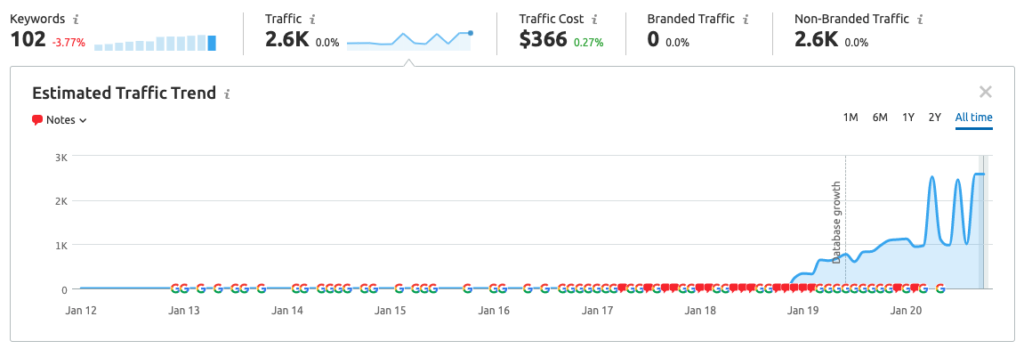
This one article brings in the highest percentage of non-branded traffic to their website. Which is great for a legal firm specialising in family law.
What is also good, is that this article appears as a featured snippet on Google. Which is arguably the best place to have your content featured.
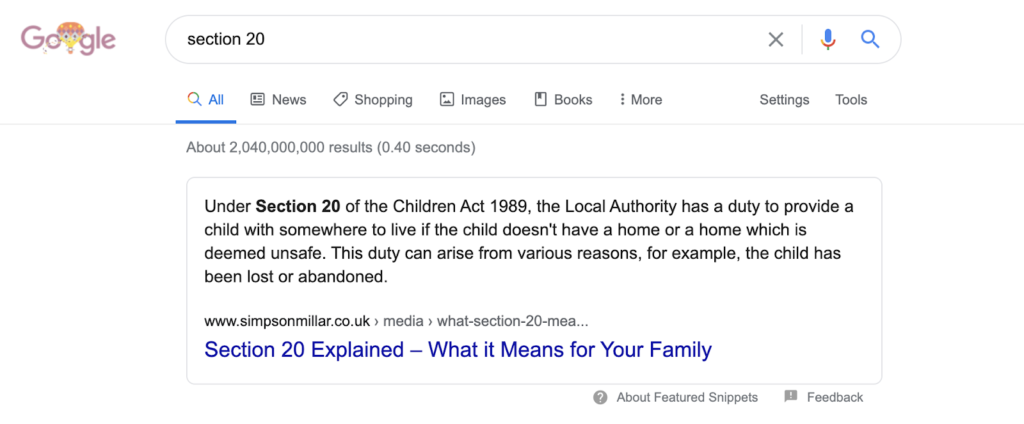
Use Local SEO to get noticed where others can’t
If your brand has a local presence, focus some time on optimising your site for local SEO. It can deliver localised awareness and attract nearby customers.
Local SEO helps rank firms high in location-based searches on Google (the map view). And, with 4 out of 5 consumers using Google to conduct searches for brands in their local area, it’s important. By focusing your attention on this area of marketing, you can reap some great benefits for your business.
Take Birketts legal firm as an example.
The map below shows that they rank in position one for the location-specific search term ‘law firm in Norwich.’
Their local SEO search results are accompanied with their review scores, opening hours and a website link.
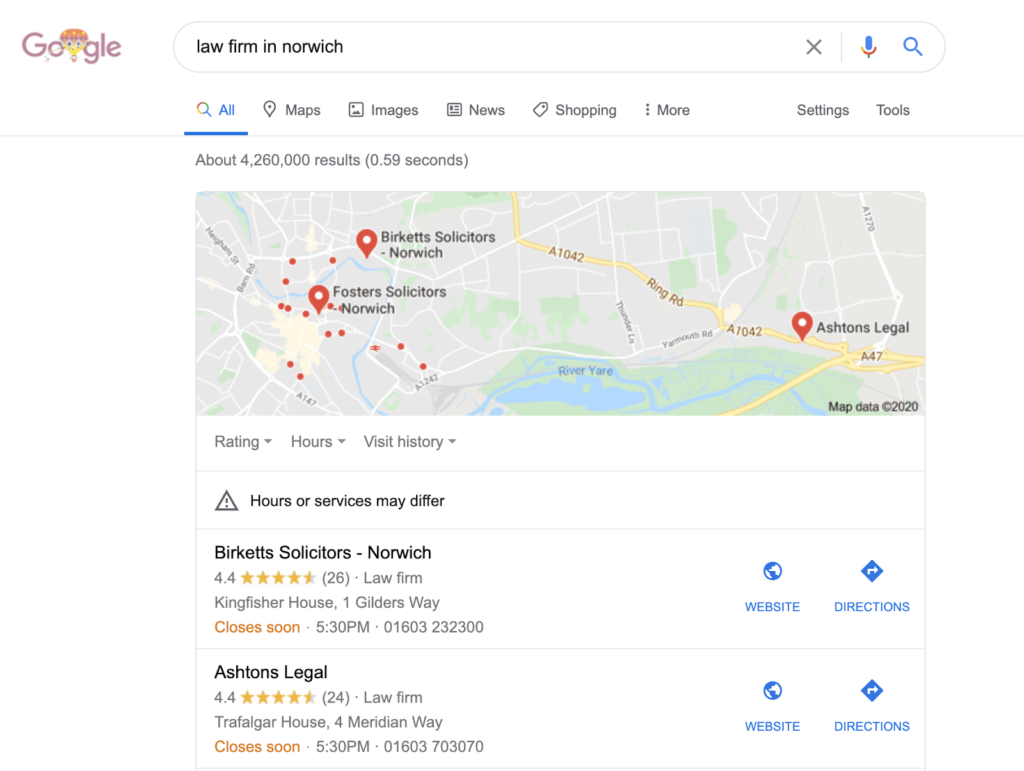
It seems like a simple step, and it is.
By properly filling out their Google My Business profile with all the essential information. As well as encouraging customers to leave reviews, Birketts have secured themselves in position one for all local searches. As such, this helps them to drive more traffic to their site.
Birketts have a location specific page for Norwich too. This page means they appear for other keywords such as ‘norwich law firms’ and ‘norwich lawyers’ too.
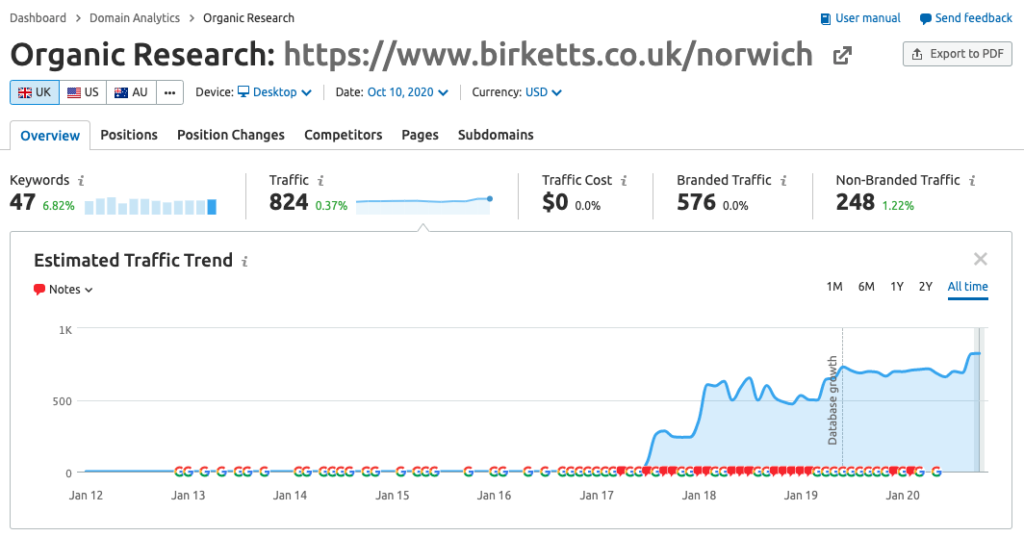
This is great, as it means that Birketts will be top of mind when customers in Norwich are thinking of getting legal advice.
Content marketing for legal companies is a must
As important as SEO is for your firm, you have no hope in ranking above your competitors without a plan.
You need to have a solid content marketing strategy in place.
Gone are the days where you could pepper a few keywords on your website to appear high in the rankings.
To be successful in today’s digital world, you need to focus on two things. Specifically, great content and great SEO practices.
The online marketplace is becoming increasingly saturated.
As a result, Google has had to develop complex algorithms to ensure searchers are met with the most relevant pages.
For you, this means making your website as relevant to your target audience as possible. Through sharing relevant, informative and quality media with your target audience, based on their search needs.
Guided by keyword research, you can identify where your audiences’ problems are. As well as what phrases they’re using to search online. Then, use this data to create the best possible content that helps answer these queries.
Content can come in almost any format. And current market-leaders in the legal content marketing niche are using a variety of content styles to engage their audience.
Let’s look at White & Case. If we navigate to the ‘Insights’ area of their website, we can see that this firm has used content marketing in a variety of forms.
This includes: case studies, press releases, news, and relevant articles.
These categories encompass many different aspects of international law which White & Case practice.

Guided by effective keyword research, White & Case has tailored their content around popular search queries relevant to their expertise.
This one IP addresses article alone, brought in over 1.3K backlinkings from 77 domains:
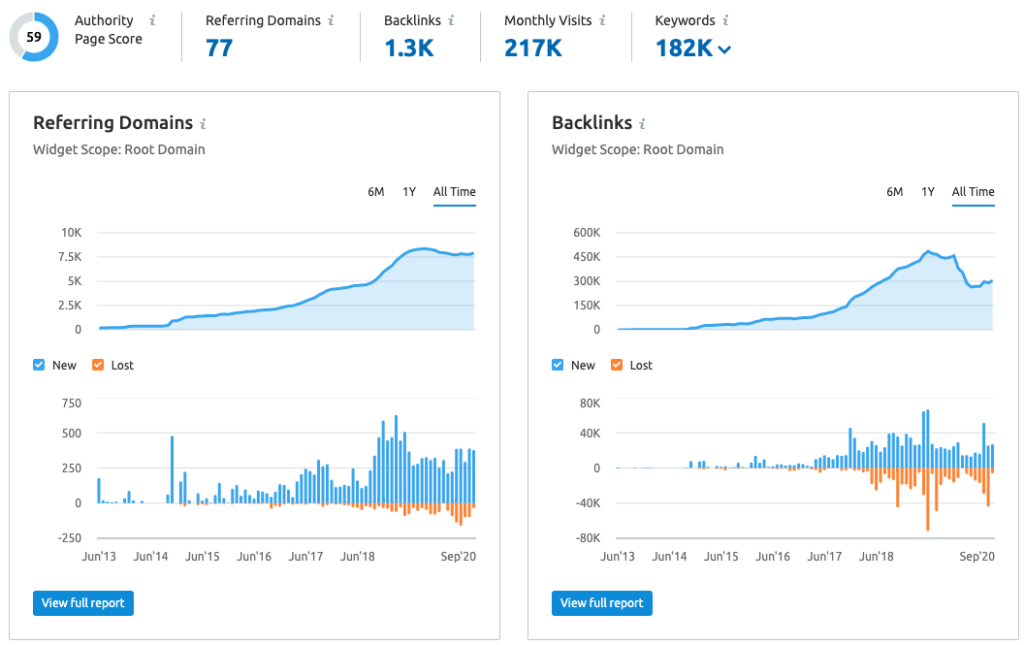
This is a great result from a single piece of content.
By creating genuinely helpful articles in their area of expertise, White & Case’s content is winning them lots of exposure.
Content marketing doesn’t just mean creating loads of articles
If we look at Irwin Mitchell’s content strategy, we can see that they adopt a different approach.
Instead of creating long-form articles, this legal firm focuses their strategy on creating visual material . This comes mainly in the form of weekly webinars and workshops.
And, they are free for people to watch, so long as they subscribe or enter their details.
In this way, Irwin Mitchell is able to capture vital contact information about their audience. All in return for a short, entertaining and informative webinar.
Encouraging users to submit their details in return for content is a great way of building their mailing list. This allows the firm to send targeted content and build connections with users in the long-term.
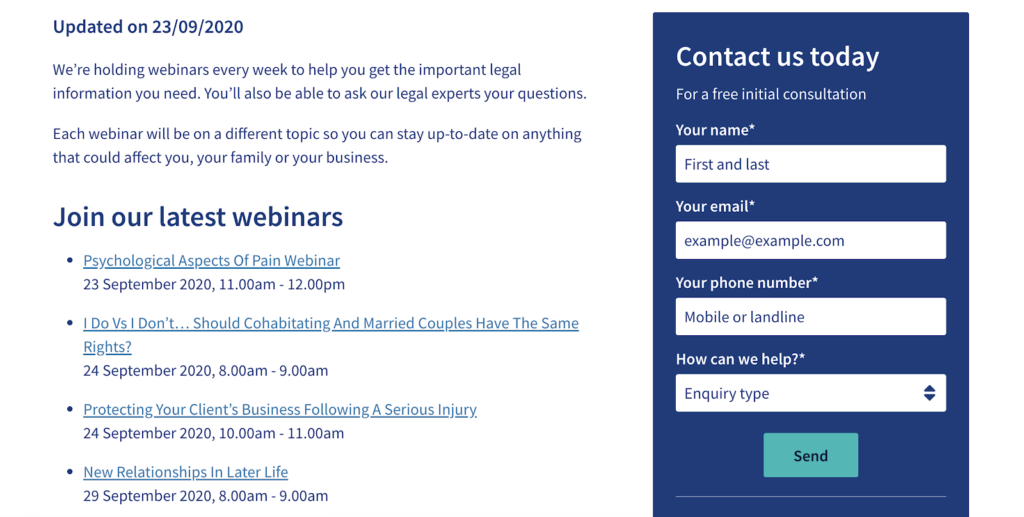
Not to mention, the use of webinars as a form of content marketing are a good way to demonstrate expertise and authority. They’re quick and easy to make too.
And they appeal to audiences who prefer audio-visual content. As opposed to the more traditional long-form reads.
Using content rich landing pages to attract traffic
Another example of where legal firms are successfully adopting content marketing is Freemans Solicitors.
Rather than creating news-based content or informative articles, this firm uses content-rich pages on their website.
These pages provide useful and relevant information about their firm and how their services can help clients.
And these pages are incredibly popular.
For example, take their page ‘Family, Children, and Divorce’. It details how the firm can help assist customers with family breakups and divorces.
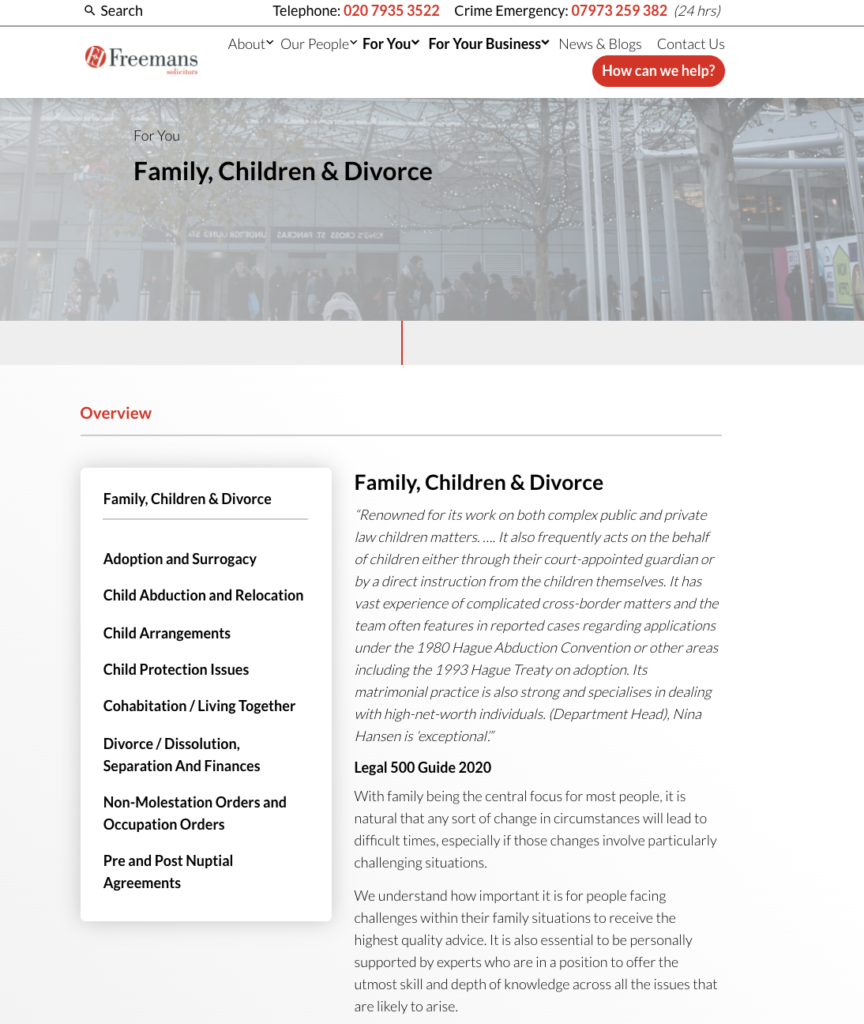
This page receives 62% of their total traffic. As well as 4.2k views on average a month.
This is significantly higher than their homepage (which receives just 22% of their total traffic and 1.5k average monthly views):
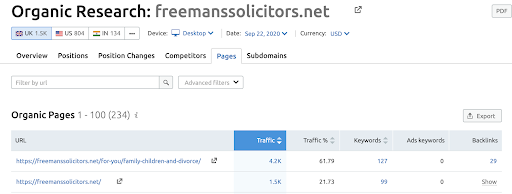
The article offers a wealth of information. It covers all the aspects of familial law and the type of circumstances where the firm can assist.
As a result, it also ranks for over 120 different keywords. As well as being linked to from nearly 30 different external websites.
Thus, giving them great exposure on the internet resulting in large amounts of traffic being driven to their website.
Want more information on content marketing? Then check out our article showcasing some of the best examples of content marketing by UK legal firms.
Supporting all your content marketing with a backlinking strategy is vital for SEO growth
Most legal firms avoid backlinking as it looks difficult and/or technical.
But without focusing attention here, it can be hard for some legal firms to overcome their competitors.
Backlinking is when a third party website links to your content from their own website.
This is especially effective when this third party website has a high domain authority (DA). High domain authority is another term for having a credible online presence. As when it links to your website, this signals to Google that other websites see your content or website as valuable in that keyword area.
Search engines will then use this signal as a factor when deciding how high to rank your content and overall website.
Typically, it’s best to aim for websites with high DA scores higher than yours. Then, you’ll be well on your way to climbing the rankings, as Google places importance on these third-party referrals.
As such, with a strong backlinking strategy, you can make your legal firm more visible to a wider demographic of searchers.
Law firm backlinking strategies in action
Backlinking isn’t a particularly difficult task to get started with.
In fact, there are some easy wins you can make in terms of getting links from credible sources.
One way to gain easy backlinks as a law firm is to make use of directories (legal and non-legal).
There are plenty of directories online. They list thousands of legal firms and incorporate links to the website listed with them
Most of them are free, or charge a relatively small fee to display your listing.
But, being one of the go-to sites for consumers seeking reputable legal firms, they’re often ones with high domain authorities.
Therefore, making them a great win in terms of getting a valuable backlink for your site.
There are also a few other simple ways to get backlinks for your firm, including:
- University law societies
- Via your local Chamber of Commerce
- Industry contacts and people in your network
For a great example of how legal firms are using backlinks, let’s look at Slater and Gordon Lawyers.
Here, we can see the company has listed themselves in an online directory called The Law Society. This directory provides information about the firm in addition to a backlink to their website.
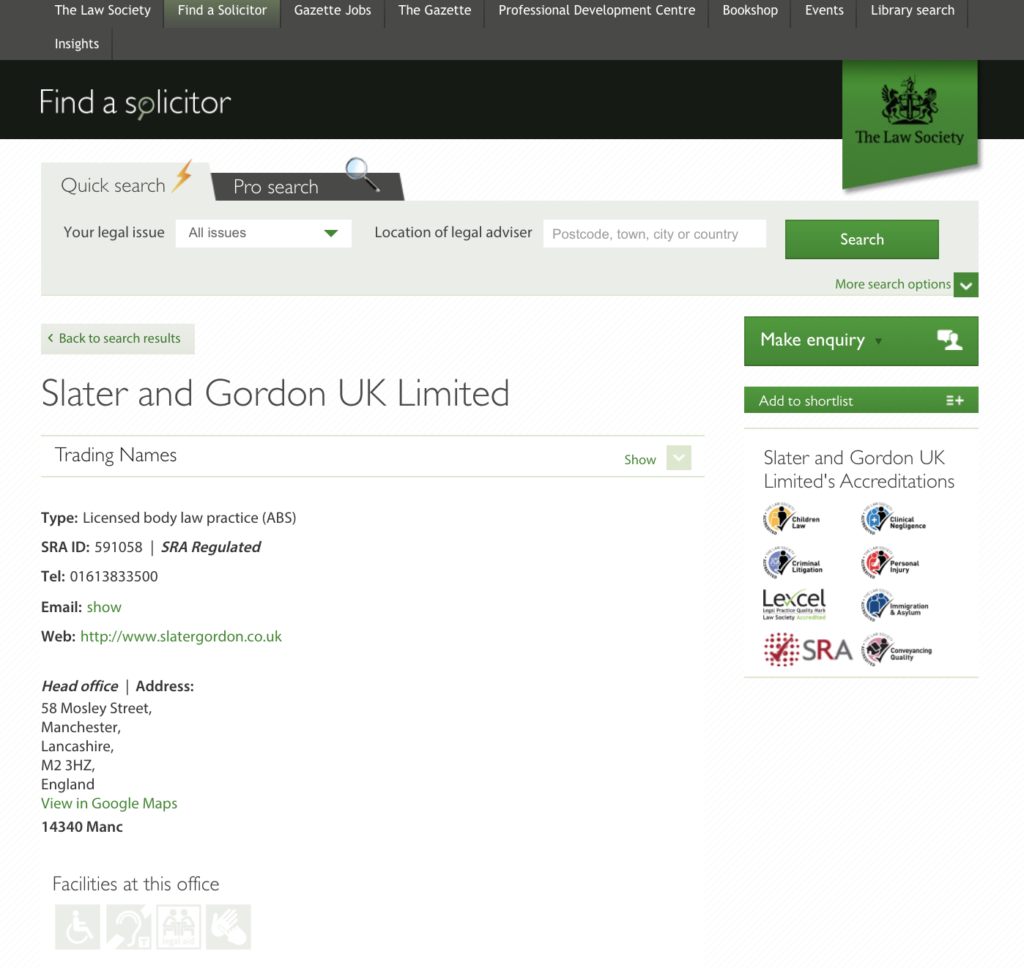

This website has a domain authority of 63. As well as an organic ranking of position one for the search term ‘directory for legal firms.’
As such, The Law Society offers a great backlink opportunity for Slater and Gordon Lawyers.
Not only can they strengthen their own website’s credibility with the valuable backlink. But they’re also giving themselves great exposure by featuring on one of the most popular legal directories that exist online.
Other ways for legal firms to get backlinks - PR
In addition to featuring on popular legal directories, Slater and Gordon Lawyers also combine their content creation with a PR strategy in order to gain backlinks.
The firm focuses their website content on sharing updates on the legal industry. Aptly named the ‘Newsroom,’ Slater and Gordon produce a mix of written articles and podcasts which dissect complex subject matters and update their audience on the newest industry news.
On top of this, Slater and Gordon Lawyers also release their articles and promote them directly to the press.
As a result, large news companies often pick up on and then create their own articles, based on these.
These articles then credit Slater and Gordon Lawyers’ work, by backlinking to their original articles. This gives the firm a strong backlink profile, filled with hyperlinks from a variety of news sources.
Receiving a backlink from an established news site is extremely valuable. This is because most news sites already have high authority scores online. This is based on their established authority. As well as the hundreds of thousands of unique visitors reading their content each day.
News sites who frequently create news articles based on Slater and Gordon Lawyers include:
- Yahoo! News
- BBC News
- The Guardian
- The Washington Post

Of course, this has been a hugely successful backlinking opportunity for Slater and Gordon Lawyers. As a result of these backlinks they have established authority as one of the leading experts within the law firm.
This process has also driven a lot of their online growth.
Social media campaigns help to humanise your law firm
Social media is one of the most powerful (and free) marketing tools available to legal firms.
With a huge active user base, social media is the perfect opportunity for brands to connect with an audience. Companies can step away from the formality of their website and invite their target audience to forge connections with them. That is, the humans behind the brand.
In summer 2020, Facebook alone has had over 2.7 billion monthly active users. This makes it the biggest social media network in the world. In addition to this, 1 billion people globally use Instagram each month. As such, the potential audience pool is pretty substantial for brands.
Add to that the recent finding of how 35% of lawyers who use social media professionally have gained new clients. And you can start to see why so many legal firms are beginning to employ it as part of their overall marketing strategy.
One particular firm that has been utilising social media marketing effectively for a while is Stephensons Solicitors LLP. This law firm focuses their social media strategy on showcasing the more compassionate side of their business. This adds a human element to their brand.
For instance, in a recent Instagram post, the firm showed how they raised £7,752.90 for MacMillan Cancer Support.
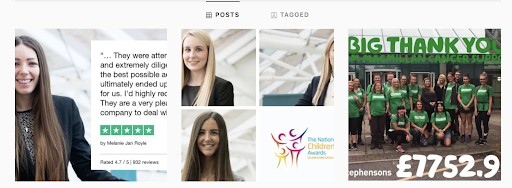
In another, they use the platform to highlight three employees. These employees were selected to appear on the panel for the National Children & Young People Awards.
The third post following on from this is a Trustpilot review. It highlights the great service that one of their employees recently offered. To add another level of authenticity to the post, the firm has included a photo of this particular employee.
All of these posts showcase the team behind the brand. And they open up a side to the business which their audience probably wouldn’t see from their website alone.
In addition to this, the brand uses social media to promote and share their content with their engaged audience.
For instance, on their LinkedIn and Facebook, Stephensons Solicitors LLP share video content. This offers a wealth of helpful information and advice for both B2B and B2C clients.

These videos attract anywhere between 100 to over 5,000 views on Facebook alone. Illustrating how effective social platforms are at helping to promote the brand’s content.
By promoting their content across their most popular platforms, Stephensons are giving themselves as much exposure as possible. Through sharing their knowledge with as many people as possible, they are building their authority as experts.
Another example of legal firms using social media to marketing their business effectively
Hodge, Jones & Allen – another personal and commercial legal firm – use social media to showcase their employees and their achievements.
Below you can see an example from their Facebook page. They have shared information about their Head of Employment Law, Susie. Promoting the fact she appeared on a special BBC Radio 4 segment.
By promoting Susie’s appearance, they are revealing the human element behind their brand. On top of this, the fact that one of their employees appears on such a high-brow radio show demonstrates their authority.
It places them as experts in the legal sector. Which helps prospective clients to trust that they are the best possible legal firm to seek service from.
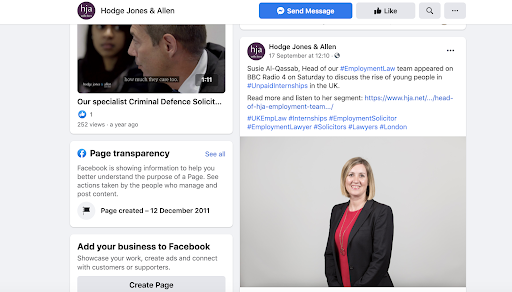
The post also shares a link to a transcript of the podcast. Thus, allowing a wider demographic of users to engage with their media – both readers and audio listeners.
However, your social media doesn’t need to solely focus on your employee’s great work or news.
As demonstrated by Slater and Gordon Lawyers, social media can also form connections with your target audience. They do this by commenting on social issues which they know their followers are passionate about.
In one post, the firm created a visual aid. It detailed some of the major findings they found in a report on sexism in the workplace.
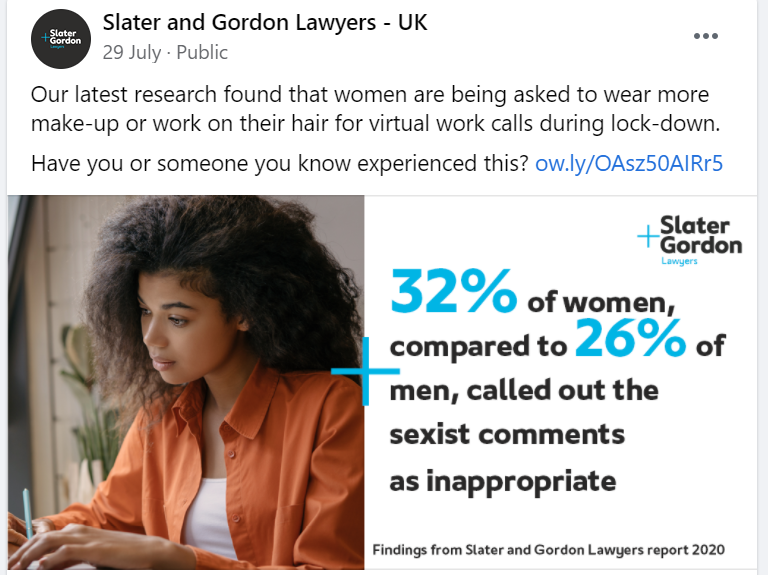
The post then linked back to the original report on their website. Giving their audience the option to seek further detail on the report’s findings.
The report received significant attention, with over 20 backlinks. Slater and Gordon hit the nail on the head when it came to producing socially-relevant issues.
By then promoting it on their social media with a simple infographic they drew more people to their site. The firm demonstrates how sharing culturally-relevant material with your audience can be as impactful as creating video or long-form content.
It’s important to note that the type of law your company represents comes into play here. And it will determine the best social media platforms for you to feature on. You don’t have to spread yourself thin across multiple platforms.
For example, if your focus is mainly on B2B services. Then you probably want to direct your energies to professional networking platforms like LinkedIn. Alternatively, if you’re a family law firm, consider focusing your energies on Facebook. As this is where a larger proportion of your B2C clients will be most active.
It’s a case of trialling a few and keeping a close eye on your metrics to see how your content is performing. This will help you decide which platforms to focus your future marketing activities on.
PPC marketing for legal firms
One of the most popular (and quick) marketing channels used today is pay-per-click (PPC) marketing.
As the name suggests, PPC is a form of paid advertising. It’s where companies pay a fee for exposure to a higher number of searchers.
These ads are hugely popular. Search engines like Google display paid ads at the top of their search results pages. Which makes them some of the most highly-clicked links on the entire page.
The company will bid on keywords that they want their ads to appear for. Then pay the fee only when the ad is clicked on, making them a great ROI.
Depending on the competitiveness of the keyword, brands will pay different amounts for each keyword. And similar to SEO rankings, brands want to try and bid to win position one in ads if possible. As this is where the most clicks come from.
In terms of using PPC as a form of marketing for legal firms, Slater and Gordon lead this area. They use a large number of pay-per-click advertisements across a variety of keywords.
As a large and established brand with significant spend available for PPC marketing, Slater and Gordon dominate the PPC market. Therefore, making it difficult for other companies to overtake them without blowing the bank.
Slater and Gordon use PPC on 1.1k keywords. This is significantly more than their competitors. To put it into perspective, their two closest competitors are Simpson Millar and Irwin Mitchell.
Both use far less ad placements than Slater and Gordon, with 747 and 55 keyword bids respectively.
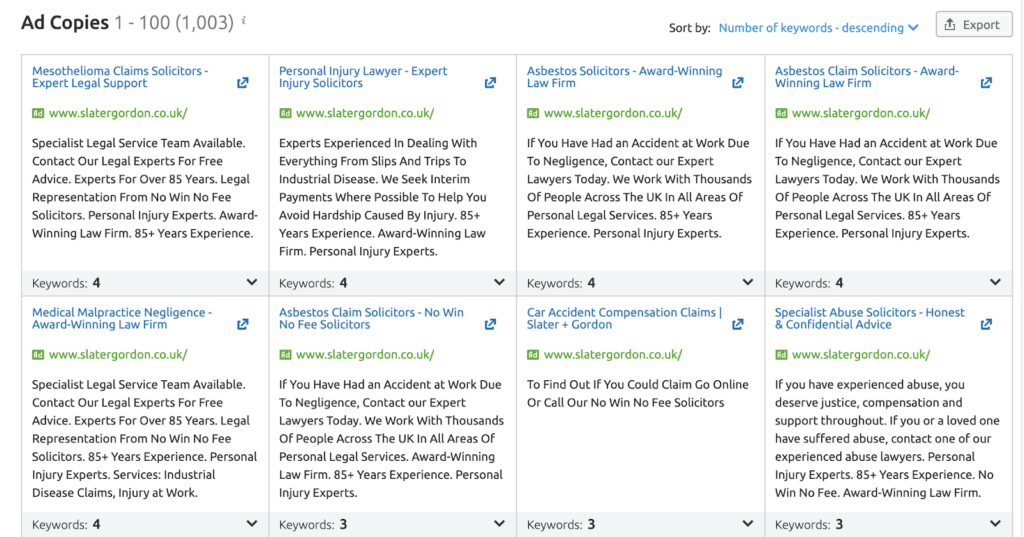
This gives Slater and Gordon an advantage over their competitors. Ranking for so many keywords makes their brand far more visible to a larger group of searchers.
In turn, they receive a significant portion of traffic over their competitors. Which means it’s easier for them to steal prospective leads.

Take the keyword ‘asbestos’ for example.
Slater and Gordon receive 3.5k page views to their desired URL from this PPC ad. Astonishingly, this accounts for 9.4% of their total paid traffic.
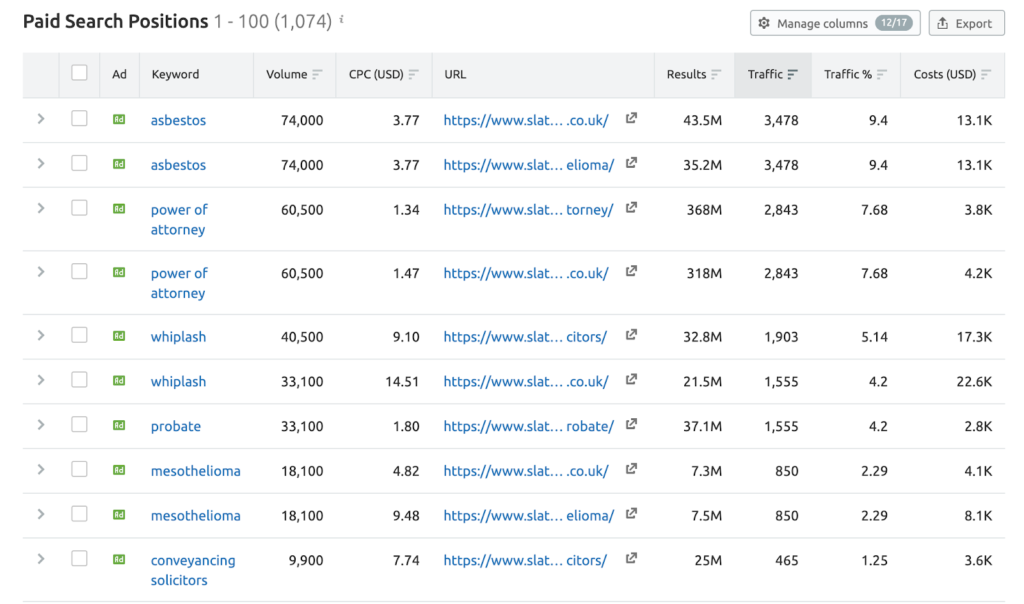
Because they can afford to be the market leader, PPC is a very effective strategy for Slater and Gordon.
For other brands to rank in position one for ad placements, they’ll need to spend a significant amount. Especially for the most competitive keywords.
As a legal firm, this doesn’t mean that you have no chance of winning ad placements. Instead, you should try looking at long-tail keywords. Or those which are less competitive and more specific to your niche.
This could open up a lot of potential opportunities to rank highly for a fraction of the price.
Email marketing nurtures your leads
Email marketing is one of the oldest and most effective marketing channels. Especially for brands looking to maintain relationships with their customers and build connections with prospective clients.
Research suggests that email marketing is actually the preferred method of contact for most customers. Newsletters have an average 4,400% ROI. With the majority of adults actively engaging with their email inboxes daily.
By building a significant database of clients, you can send targeted messaging to your contacts.
You can also nurture those who have worked with you previously.
Or develop relationships with clients who have shown interest, but haven’t yet committed to spending their money with you.
Birketts have integrated email marketing as part of their overall marketing strategy too.
As such, Birketts maximise their potential to build their mailing list. They are opening the door to conversations with hundreds, if not thousands of potential clients.

Something as simple as adding an email form on your website’s homepage can capture vital information about your site visitors. This then allows you to carry on a conversation with your audience and connect with them.
Even if you find placing the pop-up on your homepage to be ineffective, you could try offering an incentive. For example, a discounted service fee, or a free hour of legal advice with one of your experts.
Just remember to ensure that whatever email marketing you choose to do complies with GDPR notices. Or else you could face legal action yourself.
Summary
The world as we know it has changed drastically over the past ten years.
Where consumers would traditionally use their high-street legal firm. Or recommended via word of mouth. Today, the power of the internet offers consumers a vast array of options, both nationally and internationally.
For legal firms looking to remain relevant and continue to grow their client base, a strategic marketing plan is essential.
Over the course of this article, we’ve covered just some of the most common legal marketing practices. We’ve showcased the ways in which legal firms can gain more exposure online. And highlighted various examples of how to use organic and paid marketing channels effectively.
Now, it’s down to you to put the hard work in. Start by establishing your goals for the online marketplace. Then decide what resources and budget you can commit to expanding your growth.
Working with a marketing agency to grow your legal firm
Reviewing and creating a marketing plan for your legal firm is no easy task. It involves overhauling your entire business plan. As well as aligning your goals to the resources you have available.
This is before you’ve even considered pulling a specialist team together. One whose sole responsibility will revolve around growing your brand. And giving it the exposure it deserves.
Often, legal firms will outsource this area of their business. They’ll work with a marketing consultant such as myself to drive their brand forward in the most efficient way possible.
We have over a decades’ experience working across all business sectors. As such, my team and I have the ability to take your firm’s marketing to the next level.
We specialise in the delivery of a digital marketing strategy that’s bespoke to your brand. And we’ll utilise many of the digital marketing channels available to give your company the best possible chances of success.




